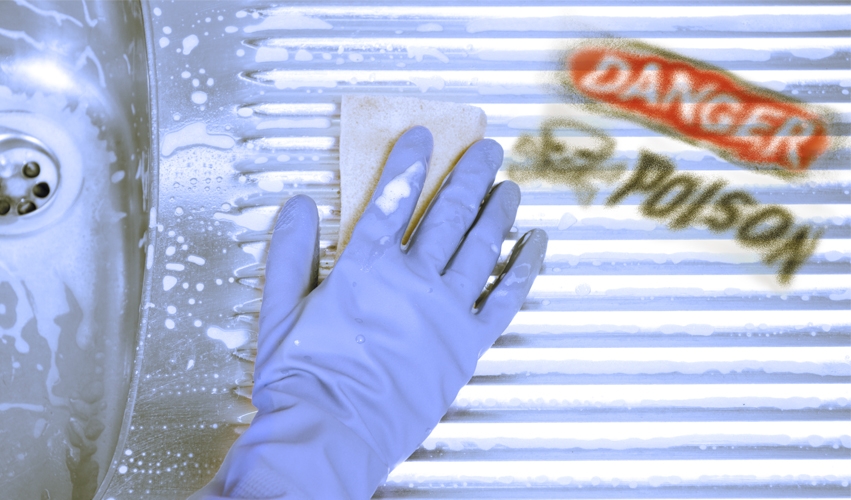Stronger alkaline cleaners can do more ‘damage’ when it comes to dirt and grime, destroying bacteria and dissolves proteins. Cleaning products like oven cleaner, lye and drain cleaners are strong alkalis. They are highly corrosive and cause chemical burns on the skin and in the lungs when inhaled.
Lye, known also as caustic soda or sodium hydroxide, is sometimes found in drain and oven cleaners. These types of cleaners are used to unclog sink drains or in the bathroom but should not be stored in the kitchen or bathroom cabinets. It emits dangerous fumes and can cause skin burns and in some cases blindness, if the fumes come in contact with your eyes. If ingested, lye can cause death so be extremely cautious – wear gloves and safety goggles when using these products as well as make sure there’s good ventilation in the room it’s being used.
Soda ash, or sodium carbonate, is used as a building block for powdered detergents and washing soda. It removes fat from drains, greasy burners and pans – this cleaner is slightly corrosive and will burn skin and corrode aluminum products.
When mixed with water, sodium metasilicate forms a cleaning solution that’s highly effective in removing dirt and marks from walls in preparation for painting. It also tackles stubborn soils on siding when cleaning the exterior of a home. Sodium metasilicate is highly alkaline and dust from the powder can irritate the nose, eyes and lungs and can cause skin irritation with prolonged exposure. Not only wear protective gloves, eye protection and a dust masks, long-sleeved shirts and pants are a must. Store in its original containers in a dry location because this compound is highly poisonous when ingested.
Trisodium phosphate is not commonly found in cleaners because most phosphates have been phased out of cleaning products, due to environmental concerns. Products that do contain it are banned or have restricted use all over the world.
At Go Green, we’re not just a cleaning company. We’re your partners in creating a cleaner, healthier, and more sustainable environment for your business in Edmonton.
(780) 437-1011At Go Green, we’re not just a cleaning company. We’re your partners in creating a cleaner, healthier, and more sustainable environment for your business in Edmonton.

With over 40 years of combined experience in the field of facilities services, We offer our clients top quality cleaning and maintenance services with high standards, and we are committed to only using environmentally friendly cleaning products. Read more below to learn about touch point cleaning, and why keeping your spaces clean is important to your health.
Read More
Typical household cleaners are on the top of the list of dangers in our homes. They cause indoor air pollution, which means many of us will suffer from skin, respiratory and eye irritation. Even if you leave your windows open and turn your bathroom fan on, you are still inhaling and exposing yourself to these chemicals.
Read More